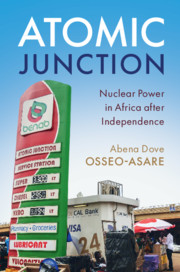Book contents
- Atomic Junction
- Atomic Junction
- Copyright page
- Epigraph
- Contents
- Figures
- Preface: Nuclear Reveries
- Acknowledgments
- Abbreviations
- 1 Introduction: “No Country has Monopoly of Ability”
- 2 Nuclear Winds: Particles without Boundaries
- 3 Scientific Equity: Physics from the Soviets
- 4 Atomic Reactors: A Fission Facility for Ghana
- 5 Radiation Within: Monitoring Particles in Bodies
- 6 Atomic Lands: Risks on a Nuclear Frontier
- Epilogue: Nuclear Power at the Crossroads
- Notes
- Persons Cited and Consulted
- Works Cited and Consulted
- Index
3 - Scientific Equity: Physics from the Soviets
Published online by Cambridge University Press: 12 September 2019
- Atomic Junction
- Atomic Junction
- Copyright page
- Epigraph
- Contents
- Figures
- Preface: Nuclear Reveries
- Acknowledgments
- Abbreviations
- 1 Introduction: “No Country has Monopoly of Ability”
- 2 Nuclear Winds: Particles without Boundaries
- 3 Scientific Equity: Physics from the Soviets
- 4 Atomic Reactors: A Fission Facility for Ghana
- 5 Radiation Within: Monitoring Particles in Bodies
- 6 Atomic Lands: Risks on a Nuclear Frontier
- Epilogue: Nuclear Power at the Crossroads
- Notes
- Persons Cited and Consulted
- Works Cited and Consulted
- Index
Summary
This chapter considers how Ghanaian scientists gleaned information on nuclear physics from different sources, most notably Soviet universities, and shared information with subsequent generations of Ghanaian students. To acquire nuclear power, Ghanaian scientists needed to become experts in nuclear physics. For many of them, that quest began in the Soviet Union. This chapter relies heavily on reminiscences of Ghana’s first generation of nuclear physicists, detailing their trials learning physics in Russian, the rejection of their Soviet training in Ghana after the overthrow of Nkrumah, and their ongoing efforts to secure further training abroad and employment abroad, whether in Gaddafi’s Libya, or for the IAEA in Vienna. These scientists sustained their knowledge and interest in nuclear physics by offering extensive training courses, first at GAEC and later at the Ghana School of Nuclear and Allied Sciences. Scientists from Ghana and visitors from other African countries who enrolled in these courses in turn shared their knowledge within a growing community of African nuclear physicists. Central to my analysis is the question of language, or what Michael Gordin has termed the “scientific Babel” of the early Cold War period, and the challenges of integrating different training experiences into a unified Ghanaian approach.
Keywords
- Type
- Chapter
- Information
- Atomic JunctionNuclear Power in Africa after Independence, pp. 49 - 76Publisher: Cambridge University PressPrint publication year: 2019

